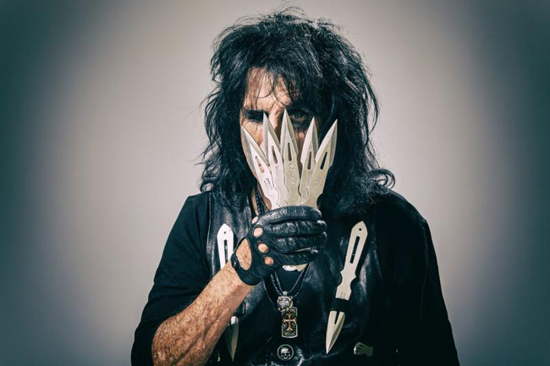
Alice Cooper is not a monster. The blood, gore and guillotines of his longtime act are but a smokescreen for some of rock’s best-made, endearingly contagious and complex (think Sondheim meets the Stooges) songs. Combine that with relentless energy and unceasing loyalty, and you get his latest album, Paranormal (earMUSIC). Produced by Bob Ezrin (Pink Floyd’s The Wall, Lou Reed’s Berlin), Paranormal was written and recorded in part with high-school pals Michael Bruce, Neal Smith and Dennis Dunaway, with whom Cooper made classics such as Killer, School’s Out and the epic Billion Dollar Babies.
You recently finished the Hollywood Vampires tour where you managed to outpace bandmates Johnny Depp and Joe Perry. How do you do it?
I’m older, but I’m in better shape that those guys. Remember, I never quit touring. It’s been like 45 years nonstop. I know how to do this, pace myself. And I really am in better shape since I don’t smoke and haven’t had a drink in 35 years. I’m on a tour now that ends December 6, where, after that, Johnny, Joe and I go in the studio with songs we wrote for another Hollywood Vampires record, which we’ll tour in 2018.
Well, that’s certainly news. Is it going to be covers of deceased friends like HV’s debut or new songs?
All originals. We did our tribute to our dead, drunk pals already, but there were a few new ones of ours on that record, too.
Without sounding corny, when you’re writing songs for an album of yours like Paranormal, do you have to put yourself in the character of “Alice”? And I don’t mean you’re putting burnt cork around your eyes.
No, I write from a perspective where the titles come first. I hear something catchy like, “I’ve fallen and I can’t get up,” that commercial—that then becomes “I’ve Fallen In Love And I Can’t Get Up.” Now that’s good. That’s the coolest rock song ever. I write from the punchline backward.
That’s classic Marx Brothers comedy.
I studied how Chuck Berry wrote songs. He could tell an entire story in three minutes. A lot of us learned how to navigate our stories though Chuck. Only my stories usually seem to have a twist ending. Think of “I’m Eighteen.” He can’t go to war or vote. He’s sexually confused. He complains through the whole song, only to finish with “I’m Eighteen … and I like it.” He embraces being confused and frustrated. That’s the trick of that song.
Paranormal doesn’t touch upon spirit visions. In fact, unlike your norm, there’s no real theme at all.
Nope. Just great songs. Besides, my whole career has been paranormal. Not like anyone else’s. A step into another dimension. Every album of mine has its own flavor. And it’s so normal for Bob Ezrin, me and whoever’s writing with us to have a theme. The “paranormal” thing about this one’s goal was to just write 20 great songs with the best 13 getting on the record. Now every character I write here—after I listened back—wound up with some mental defect, so it ended up having a theme without us planning for one.
You once told me that you wrote with horror, rock ’n’ roll and West Side Story as your reference points for records such as Killer and Billion Dollar Babies. Do young cats and new bandmate songwriters get where you’re coming from?
Here’s a funny story: Some of my guys are in their 40s. I remember saying, “Let’s do my ‘Gutter Cat Vs. The Jets.’ Let’s make it have that gang look.” So they all showed up looking like 1920s Chicago gangsters. None of them had ever seen West Side Story, so I sat them down and we watched. Funnier still, my 28-year-old guitarist Hurricane Nita Strauss—she shreds like crazy. We’re setting up a show and I said, “Let’s do ‘Pinball Wizard,’” and she said, “OK … what’s that?” I said, “You know, from Tommy.” “What is Tommy?” Now, when she heard it, she got it, but she had no reference point.
That’s not true of your old Phoenix high-school pals Bruce, Smith and Dunaway, with whom you wrote and recorded songs on Paranormal such as “Genuine American Girl” and “You And All Of Your Friends.” The classic Alice Cooper sound came from such shared references. So how did that work in the present day with you guys working together?
We loved the Beatles and those chord changes. But we were all art students, so doing creepy, surrealistic things was second nature. Dennis Dunaway was an abstract artist—still is—and he had his own twists. I remember Frank Zappa (who released Cooper’s first albums) heard us and said, “I don’t get it.”
A supreme compliment.
I was bowled over by confusing Frank Zappa. The earliest songs were written way before the real Alice Cooper. The reunion songs? The original band? We didn’t leave each other with bad blood. There were no lawsuits. Nothing awful happened. We were just creatively exhausted after doing seven albums in a row, and their tours, without stopping. We just got tired. We stayed great friends, though. We golf all the time. Neal, Dennis and Mike were actually working on new songs and I said, “Bring them around.” All three were so great that when we listened back to the 20 that we had in the can, those three floated to the top. “Fireball” is a killer. They didn’t just get to write them, though; they had to play them in the studio.
And those guys are even doing select dates with you, like a mini-set within the new band’s set?
I’m putting them to work. It feels great. I used to run track with these guys when we were kids. They’re just fun to be around, as well as the music being as smart and creative as we ever were.
—A.D. Amorosi





